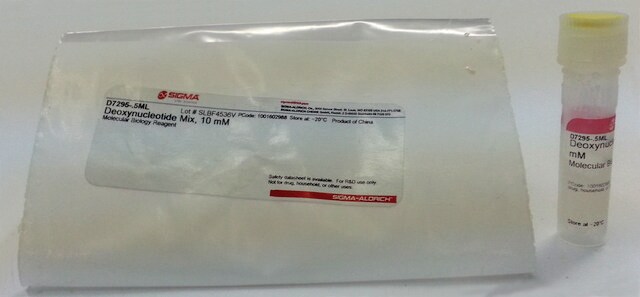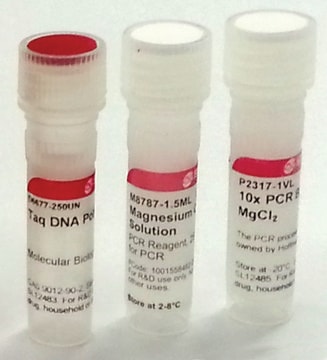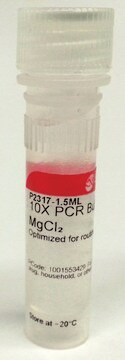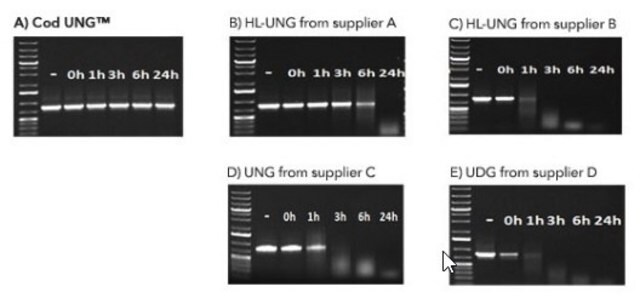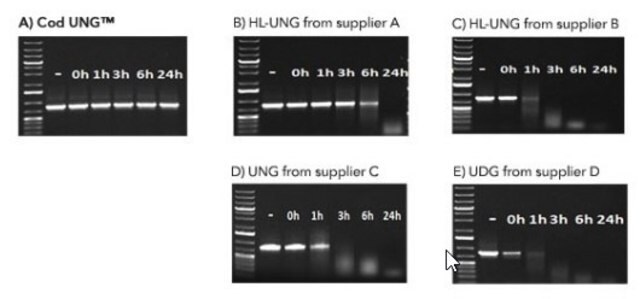Wszystkie zdjęcia(7)
Kluczowe dokumenty
SRE0113
Bst Max DNA Polymerase
recombinant, expressed in E. coli, Salt and Inhibitor Tolerant
Synonim(y):
Bst DNA polymerase, Isothermal DNA Polymerase
Zaloguj sięWyświetlanie cen organizacyjnych i kontraktowych
About This Item
Kod UNSPSC:
12352200
NACRES:
NA.54
Polecane produkty
rekombinowane
expressed in E. coli
Poziom jakości
aktywność właściwa
40,000 U/mg
Właściwości
Salt and Inhibitor Tolerant
optymalne pH
8.5
Warunki transportu
dry ice
temp. przechowywania
−20°C
Opis ogólny
Loop-mediated isothermal amplification (LAMP) has emerged as a key alternative to polymerase chain reaction (PCR)-based techniques in the amplification of nucleic acids. While conventional PCR employs a thermal cycler for repetitive cycling temperatures when amplifying, isothermal amplification techniques such as LAMP occur at a single and fixed temperature allowing the use of simple, portable, and more robust instruments for fast and exponential amplification.
The Bst Max DNA polymerase is an in-silicon designed homolog of Bst DNA Polymerase (large fragment) suitable for DNA amplification at elevated temperatures with an optimum of 65°C. Bst Max DNA polymerase is a salt-tolerant recombinant polymerase (optimal salt concentration 50-350 mM) with more than two-fold enhanced strand-displacement activity and processivity when compared to Bst polymerase. The Bst enzyme is active from 25 to 65°C. It lacks 5’-3’- and 3’-5’-exonuclease activity.
The Bst Max DNA polymerase is an in-silicon designed homolog of Bst DNA Polymerase (large fragment) suitable for DNA amplification at elevated temperatures with an optimum of 65°C. Bst Max DNA polymerase is a salt-tolerant recombinant polymerase (optimal salt concentration 50-350 mM) with more than two-fold enhanced strand-displacement activity and processivity when compared to Bst polymerase. The Bst enzyme is active from 25 to 65°C. It lacks 5’-3’- and 3’-5’-exonuclease activity.
Zastosowanie
Bst Max DNA Polymerase is
- Ideal for isothermal applications such as LAMP and RT-LAMP for its superior amplification performance and robustness, especially at point-of-care diagnostics
- Compatible with a wide range of buffer formulations and isothermal applications such as Ramification amplification (RAM), NEMA (Nicking enyzme-mediated amplification), HAD (Helicase-dependent amplification), MDA/SDA (Multiple/Strand displacement amplification), RCA (Rolling circle amplification), RPA (Recombinase Polymerase amplification)
Cechy i korzyści
- Efficient strand displacement activity allows the polymerase to amplify at a faster rate while displacing the second DNA strand during synthesis.
- High processivity ensures that the polymerase can amplify more nucleotides consecutively without dissociation from the DNA template
- Higher salt and inhibitor tolerance ensures enhanced amplification performance without the need for sample prep steps
- Ideal for amplification of most sample types, especially small and impure samples
- Triton-free formulation complies with the European Chemicals Agency’s REACH regulations to improve the protection of human health and the environment from risks that can be posed by chemicals
Definicja jednostki
One unit is defined as the amount of enzyme that will incorporate 10 nmol of dNTP into acid insoluble material in 30 minutes at 65°C.
Rekonstytucja
In solution.
Inne uwagi
Order primers for LAMP using our online configurator. For assistance with primer design prior to purchase, please use the online design tool from our partner.
Ta strona może zawierać tekst przetłumaczony maszynowo.
produkt powiązany
Numer produktu
Opis
Cennik
Kod klasy składowania
12 - Non Combustible Liquids
Klasa zagrożenia wodnego (WGK)
WGK 1
Temperatura zapłonu (°F)
Not applicable
Temperatura zapłonu (°C)
Not applicable
Wybierz jedną z najnowszych wersji:
Certyfikaty analizy (CoA)
Lot/Batch Number
Przepraszamy, ale COA dla tego produktu nie jest aktualnie dostępny online.
Proszę o kontakt, jeśli potrzebna jest pomoc Obsługa Klienta
Masz już ten produkt?
Dokumenty związane z niedawno zakupionymi produktami zostały zamieszczone w Bibliotece dokumentów.
Nasz zespół naukowców ma doświadczenie we wszystkich obszarach badań, w tym w naukach przyrodniczych, materiałoznawstwie, syntezie chemicznej, chromatografii, analityce i wielu innych dziedzinach.
Skontaktuj się z zespołem ds. pomocy technicznej
